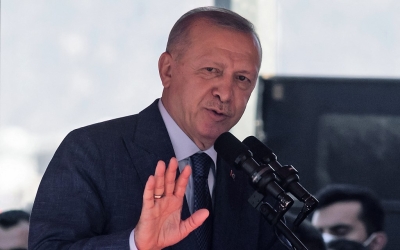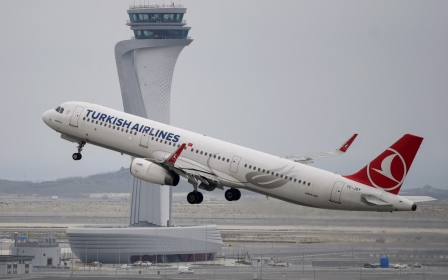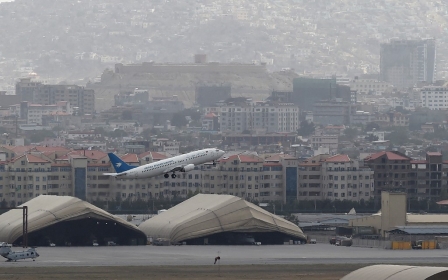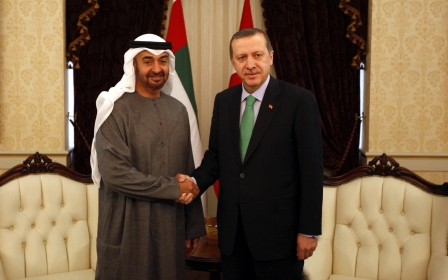Turkey hails 'beginning of a new era' with the UAE
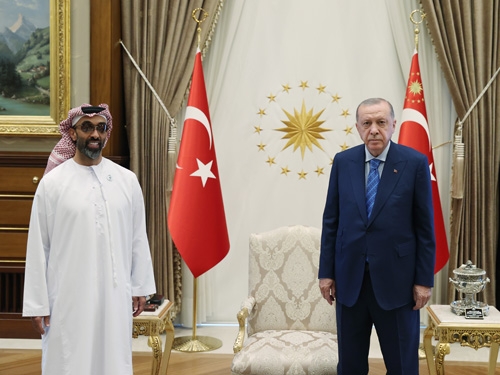
It took several months of secret negotiations, several high-level phone calls and numerous symbolic gestures for the United Arab Emirates (UAE) national security adviser Tahnoun bin Zayed al Nahyan to pose for cameras in Ankara with his former foe, Turkish President Recep Tayyip Erdogan, on Wednesday.
For the last five years, Ankara has publicly blamed the UAE for financing the 2016 coup plotters in Turkey or aggressively undermining Turkish interests in Libya.
Turkish officials had believed they were locked in a regional struggle with the UAE, with Ankara on the side of the Arab Spring, backing the new democracies; and Abu Dhabi on the other, branding Muslim Brotherhood-led governments as dangerous Islamists threatening regional stability.
But Wednesday's meeting is being hailed as “the beginning of a new era”, one senior Turkish official told Middle East Eye. “The zeitgeist pushed the two countries to work on their differences.”
Turkey sees the summit as a key step. Tahnoun bin Zayed is the top official in the UAE regarding national intelligence, sensitive foreign policy issues and the country's opaque business transactions. He is also a half brother of President Sheikh Khalifa bin Zayed Al Nahyan, and a full brother of Abu Dhabi Crown Prince Mohammed bin Zayed Al Nahyan.
“We will be in a position to meet Mohammed bin Zayed in the upcoming days,” Erdogan said on Wednesday, adding that the meeting had been arranged after talks between the countries' respective intelligence agencies.
“I hope we will resolve the problems in the region, as people who belong to the same culture and religion. I care very much about having major actors in the region talking to each other and negotiating."
With the Biden administration now at the helm in the US, Turkish officials believe Abu Dhabi feels increasingly isolated against what it perceives as the threat of Iran.
“They cannot stand alone against Tehran," a second Turkish official said. "They are extremely nervous about the US withdrawal from the region and they are recalculating their standing.”
The UAE’s relations with its closest ally, Saudi Arabia, have gone sideways recently, as the monarchies compete to attract foreign investment and diverge on what to do next in the disastrous Yemen conflict.
Riyadh last month banned travel to the UAE due to rising coronavirus cases, a move Turkish officials saw as politically motivated.
The long game
The UAE has been courting Ankara since the turn of the year.
In January, the UAE's then-minister of state for foreign affairs, Anwar Gargash, suggested that relations between the two rivals could be "recalibrated".
"We don't have any problems with Turkey, like border issues or other such issues," Gargash said during a Sky News Arabia interview, adding that if Ankara were to cut off its "support to Muslim Brotherhood" it could "recalibrate its relations with Arabs".
The UAE subsequently eased pressure on Turkish businesspeople and restarted flights between Istanbul, Abu Dhabi and Dubai.
Then, in April, Emirati Foreign Minister Abdullah bin Zayed called his Turkish counterpart Mevlut Cavusoglu to exchange seasonal pleasantries during the holy month of Ramadan. It was the countries' first direct contact in five years.
Meanwhile, Turkey’s recent steps against the Muslim Brotherhood - including a request for Egyptian opposition channels to take popular political programming off air - are believed to have been welcomed in Emirati government circles.
'Time to carry on'
Erdogan on Wednesday said that he and Tahnoun bin Zayed had drawn up a roadmap for future Emirati investments in Turkey.
The UAE's non-oil economy shrank by more than six percent last year, according to a third Turkish official, who believes Abu Dhabi sees economic potential in Turkey: its economy is expected to grow more than five percent this year alone.
Ankara’s closest ally Qatar has also pumped billions of dollars into the country.
“The main disagreement on the Muslim Brotherhood died down because they aren’t in power anywhere anymore,” the third official said.
Asked about the Turkish response to the UAE attack on the Turkish airbase in Libya's Watiya last year, the official was confident but declined to elaborate. "They paid for it in the field in Libya," he said. "It is time to move on.
“We have reached an understanding on Libya, and relations between Turkey and Egypt also improved. We don’t need to fight forever.”
This article is available in French on Middle East Eye French edition.
Middle East Eye propose une couverture et une analyse indépendantes et incomparables du Moyen-Orient, de l’Afrique du Nord et d’autres régions du monde. Pour en savoir plus sur la reprise de ce contenu et les frais qui s’appliquent, veuillez remplir ce formulaire [en anglais]. Pour en savoir plus sur MEE, cliquez ici [en anglais].


